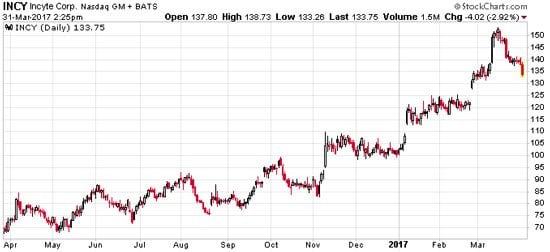Chemotherapy and radiation have been cancer treatments since the 1950s, and in the meantime, science has developed more than 200 drugs to fight cancer.
All these established treatments have one thing in common. They're all more or less "one size fits all" treatments, procedures, or regimens.
But out on the frontier of cancer research where, as I've said, the most exciting, promising discoveries (and biggest profits) are made, there's a treatment under development that's going to disrupt the field for the next several decades.
I'm talking about powerful "bespoke" cancer treatments for every patient, using their own bodies to boot.
Not only will this improve and save lives, it'll also crack open a market worth $25 billion by 2025. It really is a revolutionary development.
But the "Buy" call I'm making today is still trading at "pre-revolutionary" prices...
The "A-Bomb" in the Cancer Fight
I can't overstate this. The treatment I'm going to tell you about, as well as the most important company pioneering it, will change cancer treatment the way the atomic bomb changed the face of warfare moving forward.
 This biotech "A-bomb" is called immunotherapy, or "IO" to insiders. And it's progressing rapidly.
This biotech "A-bomb" is called immunotherapy, or "IO" to insiders. And it's progressing rapidly.
The technique is straight out of science fiction. Immunotherapy uses a patient's own immune system - "tweaking" it by either suppressing, stimulating, or enhancing an immune response - to effect a desired change. It can be used to vaccinate people and fight microbial diseases, reduce allergic reactions, suppress the sometimes devastating response to organ transplants, and, most promisingly, help patients destroy their own tumors and beat cancer.
Right now there are over 1,000 drug trials underway for IO candidates. The trials are mainly involving patients whose cancer isn't responding to traditional therapies like chemo or radiation and who are now terminal.
There's good reason to move with haste. The longer we live, the more likely we are to develop some form of cancer. It's always been a killer, but it's becoming a huge problem.
In addition to the human cost, treatments are now running about $10,000 a month, according to U.S. News & World Report. Insurers, doctors, researchers, regulators, and patients are all on the same page here. That's been an important driver in IO's development.
I'm bullish on this entire segment, and I'm not alone. Barclays is expecting IO to be worth $25 billion by 2025 - just eight years.
Now let me show you the company I think will reap the most benefit from this "frontier" research drive and incredible momentum.
This Small Company Is at the Top of the Pyramid
[mmpazkzone name="in-story" network="9794" site="307044" id="137008" type="4"]
Incyte Corp. (Nasdaq: INCY) is one of the leading IO and next-generation oncology drugmakers in the marketplace today.
Its first major drug to market was Jakafi, a drug used in bone marrow cancer called myelofibrosis, where bone marrow is replace with scar tissue. That makes the spleen swell as it takes over the job of making red blood cells. Jakafi uses inhibitors to slow or stop the conversion of the bone marrow.
Approved in 2011, Jakafi is well on its way to becoming a blockbuster drug - a drug with annual sales above $1 billion. Last year, the drug hit more than $800 million in sales, almost doubling 2015 sales. Last summer, Jakafi got Breakthrough Therapy Designation by the FDA to treat graft-versus-host disease, which happens to some patients that get a bone marrow transplant. That's another big market that should certainly push it over the $1 billion mark. Incyte CFO David Gryska raised his peak sales estimate for Jakafi to $2 billion earlier this year.
Iclusig is another drug in the Incyte arsenal. It is used to treat two types of leukemia. And in phase 3 trials begun late last year, epcadostat is looking to treat patients with advanced or metastatic melanoma.
And just recently it paid a $12 million milestone payment to Calithera Biosciences for its work on the development of small molecule IO drugs for cancer.
This makes Incyte a serious player in several niches in the expanding IO field.
And most of the spaces it occupies don't have any competitors as of yet because the field is still new to many biotech firms. That's a significant advantage, too.
I think it's going to pad your holdings very nicely.
How and Why to Buy
This firm has returned 104% over the past 12 months with far, far less volatility than the S&P 500.

What's more, compared to the "Big Pharma" firms working on IO, it's about a tenth of the size by market cap. Its IO portfolio will help it grow much faster than its larger, more diversified competition.
Its small size and full pipeline make it a nigh-irresistible takeover target, too. This company could very easily be scooped up (at a whopping premium) by, say, a Pfizer or a Merck looking to buy an IO operation with approved, proven products.
Margins are solid and earnings continue to grow at a healthy pace. The company beat earnings-per-share expectations in February, coming in a penny over forecasts, and is likely to do the same again in May 2017. The stock is already up 15% since its last report.
Incyte has plenty of cash in the bank for any new acquisitions or drug trials that need it. The stock is recently off its 52-week highs, but I'm happy to see that. It means you're getting a great stock with more blockbuster potential on sale.
It will likely consolidate here until its next big leg up, so I'm comfortable recommending everyone grab this company at current market prices, with an eye to picking up more on any unexpected pullbacks.
Michael is all about "frontier" investing, like biotech companies working on breakthroughs like immunotherapy. But he's made some pretty profitable calls in another frontier segment, too: legal cannabis. Right now, he's recommending a basket of 30 of the very best stocks in this segment in his "weed investors' bible," The Roadmap to Marijuana Millions. Click here to learn how you can get it.
Follow Michael Robinson on Facebook and Twitter.
About the Author
Michael A. Robinson is a 36-year Silicon Valley veteran and one of the top tech and biotech financial analysts working today. That's because, as a consultant, senior adviser, and board member for Silicon Valley venture capital firms, Michael enjoys privileged access to pioneering CEOs, scientists, and high-profile players. And he brings this entire world of Silicon Valley "insiders" right to you...
- He was one of five people involved in early meetings for the $160 billion "cloud" computing phenomenon.
- He was there as Lee Iacocca and Roger Smith, the CEOs of Chrysler and GM, led the robotics revolution that saved the U.S. automotive industry.
- As cyber-security was becoming a focus of national security, Michael was with Dave DeWalt, the CEO of McAfee, right before Intel acquired his company for $7.8 billion.
This all means the entire world is constantly seeking Michael's insight.
In addition to being a regular guest and panelist on CNBC and Fox Business, he is also a Pulitzer Prize-nominated writer and reporter. His first book Overdrawn: The Bailout of American Savings warned people about the coming financial collapse - years before the word "bailout" became a household word.
Silicon Valley defense publications vie for his analysis. He's worked for Defense Media Network and Signal Magazine, as well as The New York Times, American Enterprise, and The Wall Street Journal.
And even with decades of experience, Michael believes there has never been a moment in time quite like this.
Right now, medical breakthroughs that once took years to develop are moving at a record speed. And that means we are going to see highly lucrative biotech investment opportunities come in fast and furious.
To help you navigate the historic opportunity in biotech, Michael launched the Bio-Tech Profit Alliance.
His other publications include: Strategic Tech Investor, The Nova-X Report, Bio-Technology Profit Alliance and Nexus-9 Network.



